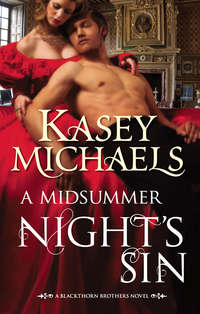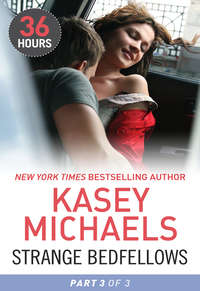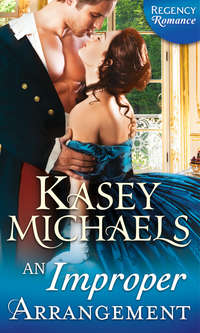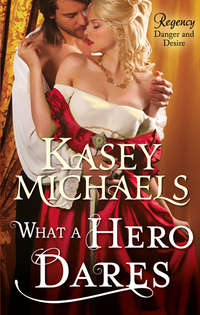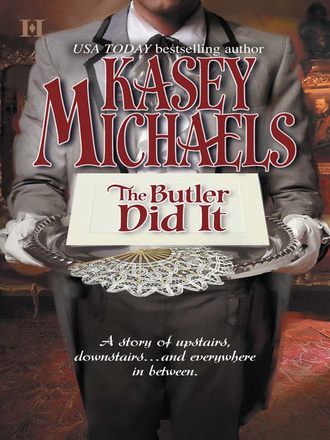
Полная версия
The Butler Did It
Mrs. Clifford the Elder, thankfully not present at the moment, was Imminent Disaster rolling on wheels, and Thornley, with his highly developed sense of self-preservation, had dedicated himself to not watching what Fanny Clifford did, hearing what she said, or speculating on what she might do or say next.
Mr. Clifford Clifford, Thornley had decided within five seconds of meeting the boy, was a dead loss, and he refused to think of him, either.
Although the mother, the Widow Clifford, held a certain nerve-shredding appeal. Thornley believed in an armful of woman, and Daphne Clifford could fit that bill very well. She had dimples, not just in her plump cheeks, but at her elbows as well, and Thornley had scolded himself mightily when he’d found himself cogitating the odds of dimples also decorating the lady’s knees.
All in all, Daphne Clifford had a look of faded glory, gray eyes like the dust of roses, and hair once red but now streaked with silver. A woman of some beauty, for all her short stature, and quite beyond Thornley’s touch. Everyone above a housekeeper was beyond Thornley’s touch; he had accepted that long ago, and had resigned himself to bachelorhood without many regrets.
He would not even speculate upon how very comforting warm, dimpled knees might be, pressed up against him, spoonlike, on cold winter nights.
“Good afternoon, Thornley,” Emma said, stripping off her gloves. “And see if you can turn off that watering pot behind me, if you could, please. It was no more than a simple walk in the Square. You’d think I just led a forced march to Hampstead Heath and back. Mama,” she added, “Riley will be happy to take your things for you.”
Daphne Clifford, who had been staring at Thornley, and smiling rather dreamily, quickly pulled off her gloves, mumbling, “I…I was just doing that, dear.”
“Yes, miss,” Thornley said, bowing to Emma, then glaring at the sniffling Claramae in his practiced, penetrating way, which quite naturally served to instantly silence her, mid-snuffle. “If you’ll forgive her, miss, Claramae has quite a fear of fog such as we’ve been enduring these past three days. She once became lost for more than two hours, as I recall, not ten feet from the kitchen door.”
Being a proper butler, and loyal to his staff, Thornley refrained from adding that Claramae could also most probably become confused and misplace all sense of direction in a small linen closet. While carrying a blazing lamp. And while gripping a length of stout string tied to the doorknob.
Daphne Clifford who, after giving over her gloves, bonnet and pelisse, had been doling out a lint-dusted penny to Riley, snapped her thin purse closed and added her mote to the conversation: “Why the child thinks we needs must take the air for a full hour every day, even when that air tastes of coal dust and we can’t see our own fingers in front of our faces…why, I sometimes wonder for her mind.”
“Yes, Mrs. Clifford,” Thornley said, bowing once more, even as he shuddered inwardly at this clearly too-intimate conversation with the woman. Wasn’t it enough that he was attracted? Did she have to make matters worse by smiling at him? Showing him those dimples? “It is my understanding that all social events have been postponed again for this evening due to this pea soup, as we here in London call it.”
Thornley would bow and agree with anyone, even the devil himself, if it would get these two ladies out of the foyer and upstairs before the tea grew cold (or his libido grew any warmer). Thornley liked an orderly household, one that ran to his schedule, and Miss Clifford’s daily walks around the Square at three o’clock pained him, and that schedule, dearly.
With a sharp look to Riley, and then to the door, the footman jumped to, pushing a rolled-up carpet firmly against the bottom of the door, to keep the yellow fog in the Square, rather than allow it to seep into the mansion. Similar measures had been taken at every door, every window, and the lack of aesthetics bothered Thornley, but not as much as waist-deep fog in the mansion would do. Mrs. Timon had already developed a hacking cough and had been ordered to her bed.
“Is there—” Daphne began, and Thornley ended, “Tea and fresh, warm biscuits await both you good ladies in the main drawing room. I do believe there is also blueberry jam, your favorite I noticed, Mrs. Clifford. If I might lead the way, madam?”
Thornley realized at once that he had made a verbal mistake, adding that bit about the jam in some absurd thought of puffing himself up in Daphne Clifford’s eyes. She immediately grabbed hold of his arm at the elbow, as if they were man and woman, not butler and well-born tenant. A lesser man would have felt a jolt of hope, but Thornley was not a lesser man. He knew his place.
“You’re so good, so kind, Thornley,” Daphne trilled, batting her remarkably lush eyelashes at him. “La, I fear we must be quite the burden to you, new to London as we are.”
“Not at all, madam,” Thornley assured her as Miss Clifford, whom he had instantly recognized as the wits as well as the anchor of the entire Clifford family, turned to pat Claramae’s arm.
“We’ll take no more walks until this fog is dissipated, I promise. I was foolish to insist, but I do so hate being cooped up inside, ever, no matter how pleasing my surroundings. And I’m very sorry you were frightened out there, Claramae,” she apologized in her pleasing voice.
Indeed, all of Miss Emma Clifford was pleasing, to the ears, to the eyes. Even to the mind, unless one was the sort to be frightened by an intelligent female. Still, for all her perfection, she hadn’t got her mother’s dimples, which at least Thornley could only consider a pity. A bleeding pity.
“Yes, miss,” Claramae said, stuffing a soggy handkerchief back into her apron pocket even as she dropped into a quick curtsy. “’Tis just that robbers and murderers lurk in the fog. Everyone knows that.”
“Possibly, Claramae, but if those cutpurses and cutthroats encountered the same problems we had in seeing even two feet in front of us, I imagine they’re all still out there, bumping into each other, cutting each other’s noses off, and no worry to us.”
“Yes, miss. I’ll take your things, miss? Everything will need a good brushing, as it’s so dusty out there.”
Emma handed over her bonnet, gloves and pelisse, and Claramae scuttled off toward the baize door under the stairs, leaving Emma to follow in her mother’s wake.
She could hear Daphne Clifford still nattering nineteen to the dozen to Thornley.
Emma sighed, shook her head and mentally attempted to compose a small homily that would convince her mother that, while Thornley was admittedly a well-setup gentleman, he was their butler, not their host.
Not that this would matter a whit to Daphne, Emma realized on yet another sigh. She had never before noticed her mother’s proclivity to gush, to eyelash bat, to simper and giggle. At home, Daphne concentrated on her embroidery. At home, Daphne still spoke well of her husband, dead these three years. At home, Daphne behaved herself.
Here, from absolutely the first moment her mother had set eyes on Thornley five short days ago, the woman had been afflicted with some strange mental aberration that had her believing she was a young girl on the flirt.
It was embarrassing, that’s what it was, and that Daphne’s old chum, Lady Jersey, seemed to encourage her was only to be considered criminal. Emma knew that Sally Jersey was laughing behind her hand at Daphne, but Sally Jersey had also issued them all vouchers to Almack’s, so Emma had steeled herself to overlook the woman’s rather perverse humor. But only until she had snagged herself a suitable husband. After that, she would cut Sally Jersey dead, and hang the consequences, no matter how much her mother seemed to admire the woman.
Emma entered the large main drawing room just as her mother was asking Thornley to please “play Mother” for them and pour the tea. She’d stopped short of asking the man to sit down, spread a serviette over his knee and join them in their refreshments, and Emma could only be grateful for that small favor.
The butler, his ears rather red, cited his inability to linger, as he had pressing duties, and avoided Emma’s gaze as he walked, stiff-backed, from the room.
“Mama, you really mustn’t do that,” Emma said, sitting down on the facing couch, the silver tea service between them.
“Really mustn’t do what, dear?” Daphne asked vaguely, making a great business out of attempting to lift the teapot before sitting back, sighing. “Much, much too heavy. You know, Emma, this is a very pretty place, by and large, but I don’t understand opulence if it’s too heavy to use.”
Emma bit her bottom lip, reached forward to place a cup beneath the spout of the teapot, then tipped the pot on its cradle to pour the tea…as the pot was designed to do. “Here you are, Mama. You must be chilled. Drink up.”
“Oh, my,” Daphne said, giving the teapot a little push with her spoon. “Would you just look at that, Emma? What will they think of next?”
“I have no idea, Mama,” Emma said, straight-faced, then looked up as her grandmother entered the room.
She resisted sniffing the air for the scent of mischief, because she didn’t want to know, and because she was a well-bred young lady. Which didn’t mean she could overlook the rather shrewd look in her grandmother’s lively eyes. Living with Fanny Clifford was rather like being in charge of maintaining the night fire in a forest, so that it didn’t go out and wolves were able to approach. One could not rest easy, ever.
“Fresh from your nap, Grandmama?” Emma asked, her voice deliberately vague, only mildly and politely interested in whatever answer her grandmother might offer.
Because Fanny Clifford never napped, and Emma knew this. What she didn’t want to know was where her grandmother had been the past hour, or what she’d been doing. No sane person would. It was better to pretend to believe a lie, and much easier than trying to explain any of her grandmother’s activities to Daphne Clifford.
“A lovely rest for these weary old bones, yes, dear,” Fanny lied smoothly as she lowered her small, paper-thin self onto the couch beside Daphne. “And you two were out mucking about in the fog again, I suppose? You’ve a smut of coal dust on your nose, Daphne.”
Daphne quickly raised her serviette to her face, exclaiming, “Oh, no, no! No wonder he looked at me so oddly. I could just Expire. I’m So Ashamed.”
“Twit,” Fanny Clifford muttered, winking at her granddaughter. “There’s no smut, Daphne. I was merely checking to see if you’re still so arsy-varsy over Thornley. And you are. And still making a cake out of yourself, I have no doubt. My wastrel son must be spinning in his grave, that you’d think to replace him with a servant. Of course, Thornley is butler to a marquis, could even be called a majordomo, so that might have Samuel not rotating quite so fast. The boy always was hot for titles.”
“I am not making a push for Thornley, Mother Clifford,” Daphne protested, but she did not look the older woman in the eyes. “Doesn’t he have the loveliest posture? Samuel always slouched so.”
Emma added two sugars to her tea. “Grandmama, remember, we are not to specifically mention the marquis in public unless forced to do so, and then just to say that he is our unfortunately absent host. Thornley was adamant about that. I think the poor man must be strapped for cash, which is the only explanation I can find as to why he leases rooms to perfect strangers for the Season. We were even quite vague with Lady Jersey on her single visit here, as you might remember, although she is much too interested in herself to notice where she is when she’s telling all and sundry how very wonderful she is. But we must protect the man’s reputation.”
“Humph. If it’s his reputation he’s worried about, you’d think he’d at least vet whom he leases to better before allowing them to run tame in his household.”
Emma put down her spoon very carefully, trying to hang on to her composure. She had two choices: ignore what her grandmother just said—hinted at—or ask the woman what she meant. She must be feeling daring, or else the fog had muddled her mind, because she then took a deep breath and asked, “What have you done this time, Grandmama? Waited until either Mrs. Norbert or Sir Edgar went out and about, and then pored through their belongings?”
“Oh, don’t be silly, Emma. Your grandmother would never do any such thing. It would be unladylike, and too shabby by half,” Daphne scolded, brushing pastry crumbs from her skirt. “Would you, Mother Clifford? Sneak about, that is, and poke into drawers and such?”
“Here’s a lesson for you, Daphne. You, too, Emma. Never ask questions you wouldn’t want to hear answered.” Fanny shook off Emma’s silent offer of tea (a move meant to shut the woman up, at least for a few moments), stood, and headed for the drinks table. She picked up the decanter of sherry, made a face at it, then poured herself two fingers of port.
Daphne looked to her daughter, her eyes wide. “She wouldn’t…she couldn’t go poking about in…she—oh, Lord, she did, didn’t she? No, don’t tell me. I don’t want to know. Tell me!”
“She did,” Emma admitted to her mother. Why hadn’t she waited until she and Fanny were alone, before opening this particular jar of worms? “But,” she added quietly, “I believe that was yesterday.”
Emma looked at her grandmother as that tiny, always energetic woman sat herself down once more, and decided she had to know everything, now. “What was on today’s agenda, Grandmama? Waiting until one of them fell asleep, and then prying open his or her mouth, to count teeth?”
“A good hiding, Emma, I’ve always said you should have had at least one during your formative years. Don’t badger an old lady, all right? If you behave, I may make you happy and tell you that I have been badly served for my inquisitive nature.”
“You got no reward for your nosiness, you mean,” Emma interrupted. “Good.”
“A dozen hidings wouldn’t have been enough,” Fanny said, sipping at her port. “But I tell you, I’m extremely disappointed. Mrs. Norbert, after a careful investigation of her belongings—oh, Daphne, close your mouth before a fly lands in it—is a seamstress.”
Emma blinked. “Well, yes, she said as much, Grandmama, that first night at dinner. A seamstress who came into some inheritance or another. She doesn’t wish to enter Society, but only to be treated like a lady for a few months, being waited on, eating well. She hasn’t tried to hide her past. What of it?”
Fanny rolled her still bright-blue eyes. “A seamstress, Emma. You know what that means. Or, what it usually means, not that old hatchet face would have been more than a penny-a-poke gel, up against some slimy warehouse wall.”
Daphne dropped her teacup—it shattered against the edge of the table—before slapping her hands over Emma’s ears. “Mother Clifford! I’ll not have you saying such things with my innocent daughter here. Or with me here, come to think of it. Samuel always said you had a mouth that needed a good scrubbing with strong soap.”
Emma calmly reached up and removed her mother’s hands, unfortunately just in time to hear Fanny go off on one of her favorite jaunts—that of riding up and down her daughter-in-law’s tender sensibilities.
“Oh, stubble it, Daphne. You knew what I meant, which shows you to not be as pure and ladylike as you wish you were. You couldn’t have been, living with Samuel and his constant peccadilloes with various bits of the muslin company. That, dear girl,” she ended, looking to Emma, “would be whores, lightskirts and, once, when he was particularly flushed from a win at the tables, a kept woman he lost in the next run of his usual bad luck.”
“You never liked him. Your own son.” Daphne sighed deeply. “And to that, Mother Clifford, I can only say For Shame.”
Emma had enough of her mother in her to be at least marginally horrified, and enough of her grandmother in her to have to remind herself not to laugh out loud. Suddenly, Mrs. Norbert seemed a safer topic of conversation. “How…” she asked at last, “…how do you know Mrs. Norbert is a seamstress, Grandmama, rather than a…a seamstress?”
Fanny sniffed. “Her sewing basket, for one. Packets of pins and needles, a well-worn darning knob, a full set of workmanlike scissors. That basket isn’t for show, I tell you. It has been used. That,” she said, “and the fact that her underclothes and nightwear are of sturdy, oft-mended spinster quality. Meaning,” she ended, looking to her daughter-in-law, “they were never meant to see a man, just a long, cold winter.”
“So you did sneak into her room and look in her drawers,” Daphne said, slowly catching up.
“Looked at ’em, picked ’em up and inspected ’em,” Fanny said (as Emma gave in and began laughing), then downed the remainder of her port. “I had so hoped she’d been a streetwalker, even a kept woman. But she’s a demned seamstress, which makes her about as interesting as the mud fence she so greatly resembles. But I have hopes yet for Sir Edgar. There’s something about that man that screams out to be investigated.”
Emma sobered. “Grandmama, you will not be looking at his drawers, understand? I won’t have it.”
“And I’m not interested in his drawers. He’s older than dirt,” Fanny shot back. “I’ve got bigger fish to fry, gel. I just want to know our fellow tenants. Or are you looking to get murdered in your bed?”
Emma sighed in the midst of picking up shards of very fine china cup and looked to her mother, who was going rather pale. “She doesn’t really mean that, Mama.”
“Yes, she does,” Fanny said, winking at her granddaughter. “There we’d be, dreaming sweet dreams, and bam, eternal rest, with sewing scissors sticking out from between our ribs. Or maybe a pillow over our heads, pressed there by Sir Edgar, who is really a bloody murderer who, even as we lay there, cold and dead as stones, spends the rest of the night going through our drawers.”
“She doesn’t really mean that, either, Mama,” Emma said as Daphne clutched an embroidered silk pillow to her ample bosom. “Grandmama, you’re impossible.”
“And I pride myself on it,” Fanny said, standing up to go refill her glass. “Except, of course, you’re so easy, Daphne. I really wish you’d give me more incentive to tease you. But, then, I’ve got other fish to fry here in London, don’t I? And them I’ll tease to much better effect.”
Emma laid the pieces of broken china on the tea tray and sat back once more, to stare in her grandmother’s direction. “What are you planning, Grandmama? We’ve got some funds left, but probably not enough to bribe your way out of the local guardhouse. And, come to think of it, we’d first need to take a family vote as to whether or not we’d wish to spend our last penny saving you. I’d consider that, Grandmama, as I know where my vote would go, and Cliff still hasn’t quite forgiven you for making him ride all the way here inside the coach with us.”
“You should both thank me for that. You know what would have happened if he rode up with the coachman. He’d have found some way to take the ribbons, and we’d all be dead in a ditch right now.”
“Dead, dead, dead,” Daphne lamented, still clutching the pillow. “Have you no other conversation today, Mother Clifford?”
“I do, Daphne, but you don’t want to hear it. Now, Thornley told me that all social events have been postponed again because of this fog, which leaves us at loose ends this evening, again. I’m bored to flinders, frankly, so what I thought was that we could corner Sir Edgar, all three of us, and press him for a bit of his history. You know. Where he was born, who his father was, why he keeps several extremely large, heavy trunks hidden behind the locked door of his dressing room. I saw them go up the stairs when he arrived, but they’re sitting nowhere they can be seen. He has to have locked them up for a terrible reason.”
“Let’s talk about locking you in your dressing room,” Emma said succinctly, ringing the small bell on the tea tray, at which time Thornley appeared in the doorway, just as if he’d been standing right outside all along, waiting for the summons…and hearing every word the ladies said.
“You rang, Miss Clifford?” Thornley inquired, already picking up the tea tray, and not appearing at all surprised to see that one of the marquis’s priceless china cups was now in seven uneven pieces.
“Yes, thank you, Thornley,” she said, laying her damp, tea-stained serviette on the tray. “I was wondering—” she looked straight into the man’s eyes “—do you happen to know the whereabouts of Mr. Clifford?”
Thornley, eyes quickly averted, looking somewhere in the vicinity of the portrait of the late Marquis and several of his hounds that hung over the mantel, said, “I believe he is resting, Miss Clifford.”
“He’s still in bed?” Emma sighed. “It’s nearly gone five, Thornley. What time did my brother get in this morning?”
“I couldn’t really say, Miss Clifford,” Thornley said, still avoiding her gaze, even as she stood—which didn’t come close to putting her on eye level with the man, but she’d hoped to at least be able to read his expression.
But Thornley had no expressions, other than Proper, and possibly, Prudent.
“Very well, as I know he accompanied my brother, I’ll ask Riley,” Emma said, brushing past him as she headed for the stairs. She stopped, turned back toward the pair of sofas. “Mama? Do you have another penny?”
“That won’t be necessary, Miss Clifford,” Thornley said stiffly. “Riley escorted Mr. Clifford to a…a sporting event last evening, and they returned here at approximately six this morning, Mr. Clifford rather the worse for wear. Riley has been reprimanded, Miss Clifford.”
“A sporting event?” Fanny asked. “What was it? Mill? Cockfight? Oh, wait. A sporting event, you say, Thornley? Or a sporting house?”
Emma watched as Thornley’s ears turned bright red. Poor fellow. He could keep his spine straight. His expression never betrayed what he might be thinking. And she hadn’t really needed to see his eyes. Those ears of his were a dead giveaway.
“Ah!” Fanny crowed, punching a fist into the air. “Good for him, and about time, too!”
Daphne, who had come within Ames Ace of swooning into the cushions at the thought of being murdered in her bed, now gave way to the blessed darkness that swam before her eyes.
DARKNESS WOULD HAVE BEEN swimming in front of Morgan’s eyes, save for the fact that the fog wouldn’t let it. The entire countryside had turned a thick, ugly gray-yellow, slowing the progress of the pair of coaches to a crawl.
They should have reached London hours ago, he knew, snapping shut his pocket watch after checking the time. He’d returned to the coach at the last posting inn, to rest Sampson, and because he did not much care for the feel of the gray-yellow damp on his face, but it was now past his usual dinnertime, and he was hungry. Damn early country hours, where he’d become accustomed to eating his main meal long before six.
“We still should arrive before eight, don’t you think?” he asked a morose and rather pale-looking Wycliff, who didn’t seem quite at his best riding backward in the coach. “In plenty of time for supper.”
“I…I really hadn’t thought much about…about food, my lord,” the valet choked out, somehow able to speak without really opening his teeth.
“Really? And here I am, famished. As I recall the thing, Mrs. Timon always had a way with a capon. Gaston will be in charge of the kitchen while we’re there, but for the most part, Mrs. Timon does just fine. Except for the eel. Don’t care for eel, Wycliff,” Morgan said, watching the man closely.
“I…I also don’t care for…for eel, my lord.”
Morgan was being perverse, he knew it, but he had cause. Wycliff had made a cake of himself after departing that last posting inn, insisting almost to hysteria that the three harmless-looking farmers who had shared the common room with them were sure to follow the coaches, intent on slitting their throats.
Morgan would consider a figurative crawl inside Wycliff’s head, just for a moment, to see where the man’s brainbox had been wound up incorrectly, except he’d first have to fight his way through the maggots that doubtless collected there.


